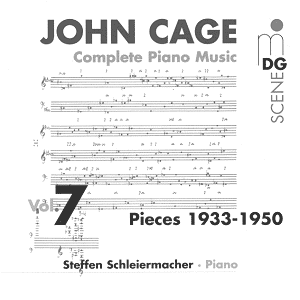Here, at Volume 7 of his series, Schleiermacher presents a
selection of Cage's early works, written during a period when the composer
wrote mainly for percussion or prepared/non-prepared piano. They also
represent Cage's output while studying with his teachers Richard Buhlig,
Adolph Weiss, Henry Cowell and Arnold Schoenberg.
The works are not presented chronologically, so if
you want to hear them that way a certain amount of re-programming is
required.
The earliest composition, 'Three Pieces' of 1933, consists
of 'Rounds,' 'Duo' and 'Infinite Canon'. Sample the first piece, a delicate
composition in two parts throughout which is amazingly beautiful in
its simplicity. This delicacy returns time and time again during the
recital. Schleiermacher seems as at home here as with the most cripplingly
difficult Darmstadt compositions: no mean feat, therefore, to be so
convincing at both ends of the scale. The disc is gripping throughout.
The disc begins with the three compositions from the
mid-1940s. 'Soliloquy' (1945), is introduced by a bold bass statement
which leads to a three-minute piece based on dancing rhythms: indeed,
rhythm seems to take precedence over pitch. It was originally part of
the cycle 'Four Walls' for voice and prepared piano. After its premiere
it was not played again until 1985.
'Ophelia', subtitled 'Music for the Dance by Jean Erdmann',
was choreographed in 1946. Like many of Cage's pre-1950 works, rhythm
is of prime importance. Texture, tone colour, dynamics and tempo all
take precedence over melodic development or harmony.
The one-act ballet, 'The Seasons', written for Lincoln
Kirstein, was completed in 1947 and is closely related in its material
to the 'Two Pieces' of 1946. The quiet, restrained 'Prelude I' is an
appropriate prelude to the sparse and pointillist 'Winter'. Schleiermacher's
variety of touch is superbly represented by the bouncy second Prelude
and 'Spring' (positively Debussian in its washes of sound). The third
Prelude is, perhaps surprisingly, subdued, but makes sense in the perspective
of the delicate Cage-ian Summer.
'Metamorphosis' (1938) is another extended piece on
the disc (15'39). Schleiermacher plays with crystal clarity: the second
movement is an intriguing play of texture and register; the fifth an
final movement, from its delicate opening, builds to become quite monumental
in feeling.
The 'Two Pieces' of 1946 (together running for 9'26)
represent Cage at his most powerful: the meaning inherent in the single
line and silence are here heard in pure form, along with a brittle,
Webernian beauty. In the first piece, Schleiermacher plays so quietly
that he seems to merge with the silence and then to emerge inevitably
out of it: a virtuoso demonstration of both technical and interpretative
control.
Brittle delicacy also forms part of 'Crete and Dad'
(1945). Here are two portraits of Cage's parents ('Crete' = 'Lucretia').
The almost Bachian calm of 'Crete' contrasts with the harder-edged 21
seconds of 'Dad'.
A rewarding CD, therefore. The inclusion of the second
movement of 'Quest' (1935), composed for a choreography by Martha Deane,
is noteworthy for its de-contextualisation of traditional chords (the
first movement is an improvisation for various amplified objects and
is not included here; the second movement was not published until 1977).
'Soliloquy', 'Jazz Study' and 'Crete and Dad' would all make effective
encores to an adventurously-programmed piano recital.
Colin Clarke


